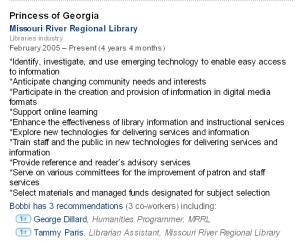and online reputations in general.
I have a profile on LinkedIn (as I do on many social websites) because many people and blogs I think highly of have recommended it. Now I’ll be the first to admit I’m probably not using it right and therefore not taking advantage of it properly. Here is something I noticed recently while updating my profile.
This is a section of my profile showing my position at MRRL. Three people wrote me recommendations (which I appreciate but I’m not sure what good they do)
After these kind people wrote wonderful things about me I can change my position anyway I like. In this case I made myself Princess of Georgia.
I know what you’re thinking, there is no Princess of Georgia and if there were it certainly wouldn’t be me. 😉 That isn’t the point. I can change my job description, title or any part of the position at any point on LinkedIn and those recommendations stay right there.
This is my problem with online reputations. As more of us establish an online identity, we interact more with others we meet online and we base our opinion of them on who they are telling us they are. Why does this matter? Because people have always been dishonest from the small tweaking of facts to outright lies. There is no one following me around the web ensuring I’m not fabricating facts. Even if someone suspected I was not the Princess of Georgia, what could they do? Maybe blog, maybe contact me, maybe tell their friends but those are pretty aggressive and don’t necessarily put the person doing it in the best light and most people just aren’t going to do it.
Because more professional opportunities are based on online reputations, this is important. We come to think of the people we interact with as colleagues and friends and we make recommendations or offer opportunities based on this relationship. Unfortunately there are some things you just can not know about someone unless you’ve worked with them.
I’ve received recommendations on my reputation and I’ve given them too. I’m not saying don’t do it and everyone you meet online is lying to you. I’m just reminding you of the old saying – “On the Internet, nobody knows you’re a dog“.



Leave a comment